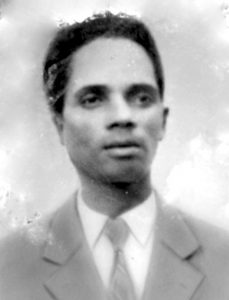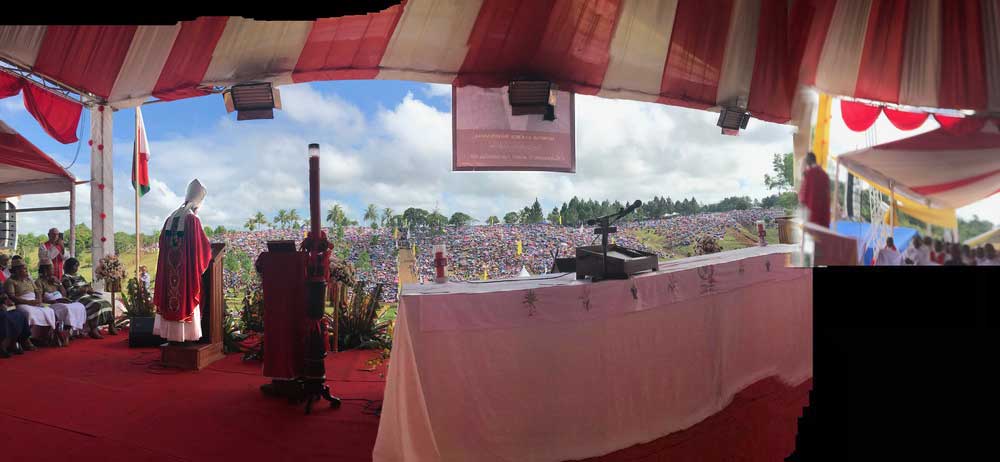The Secular Franciscan Order participated in all the preparatory phases of the beatification ceremony. For the great Franciscan family – 1,000 secular and religious — it was a moment to live fraternal joy in one community…during three days of pilgrimage: 13, 14, 15 April 2018. The pilgrimage began at a church near where Lucien lived (near where the OFS erected a small monument in memory of Lucien) and concluded at the beatification ceremony where Franciscans joined 60,000 faithful.
— Dr. Gérard Cécilien Raboanary, OFS, national minister of Madagascar
“Lucien taught people how to do good, to live in peace with others, to form a fraternal, welcoming and respectful community… To hatred he responded with charity, to division with communion, to falsehoods with truth, to evil with good. He was an authentic teacher of a good life: a good citizen, a loving father, a loving husband.”
– Cardinal Angelo Amato, Prefect, Congregation for the Causes of Saints, in a sermon prepared for the beatification ceremony on April 15, 2018.
Those words, written by Cardinal Angelo Amato for the beatification of Lucien Botovasoa, OFS, accurately describe the man, but his passion for life, and death, can only be revealed by taking a closer look.

Blessed Lucien Botovasoa was born in 1908 in Vohipeno, Madagascar at the southeastern end of the island. The missionaries in his village noted early that Lucien had special gifts and they sent him to study with the Jesuits. Upon his return to the village, he became a parish school teacher and give his many gifts as an exceptional musician and singer, a great sportsman, a speaker of five languages – Chinese, English, French, German and Latin — to the service of his students and the church. He would often end his lessons by reading the lives of the saints to the children. The lives of the martyrs seemed to interest him the most. He was so captivated by their stories that he shared with his wife and father the fact that he would be quite joyful to give his life. His only regret would be to leave them.
In 1930 Lucien married sixteen-year-old Suzanne Soazana. They had eight children, five of whom survived. Lucien was a devoted husband, but often, Suzanne would complain to him that he was too devoted to the church and that he would leave her and the children to serve the church. Indeed, Lucien did spend hours in prayer – at church, at home and even got up during the nights for prayer. When Suzanne would make such accusations, he would laugh and say that it would be a sin to do such a thing.
This passion and love that Lucien had for his God was also noted by a local nun who said to him one day, “If only you had gone to the seminary, you would have become a priest. Do you regret having married?” Lucien responded without hesitation: “I do not have the slightest regret. On the contrary, I am very happy about my state because God called me for this: to be a layman, married, a teacher. This way, I live with the people of the village, and to attract them, I can do what you, Fathers and Sisters, cannot do because most of them are still pagan and I can show them a Christian character that is accessible to them because I am not a stranger among them.” Lucien understood the rights and duties of lay people in the Church, and the complementary role they play with the priests and nuns.
While he understood his state in life, Lucien sought for a more formal way to live this vocation in the secular, married state. One day, he stumbled upon the Rule for Franciscan Tertiaries, also known as Third Order Franciscans, now known as Secular Franciscans. This was what he was looking for! He embraced the charism of St. Francis and the Rule – accepting a more simple life, going deeper into his prayer life and fasting, wearing pants and khaki shirt and a cord as a belt that represented his new direction in life, joyfully serving and living the Gospel as Francis did.
Since there were no Third Order Franciscans in his village, Lucien sought out people whom he thought would make good Franciscans, but they all rejected his offer, saying they were too busy and already too involved in the church. Lucien did not give up and finally found a mother who indicated an interest. They began meeting – and every Wednesday night, the joy of Lucien and his enthusiasm about the Rule grew and spread. The zeal of the first associates is an authentic “bubbling over.” His companions remembered how their heart would beat when he would talk about the happiness of the Christian who lives in self-sacrifice, especially if this can lead to the death of the martyr!
Suzanne did not like the image of Francis and the Wolf that Lucien had hung on their wall and she would shout, “He’s the one that makes you crazy!”, fearing he would abandon her and the children … to which Lucien would burst out laughing, reassuring her that he would never leave her. He was professed as a Third Order Franciscan in 1944.
Lucien prayed incessantly. Whenever he would walk along the village roads or go to visit his father in another village, he would be saying his rosary, often inviting those walking alongside to pray with him. He was so engaging and passionate in his prayer that many would join him. He was Franciscan in spirit and joyful.
During the mid-1940s Madagascar was in the midst of a civil war where Catholics were thought to be conniving with the French colonialists and were, therefore, persecuted. During Holy Week of 1947, churches were burned and many faithful were killed. On April 14, 1947, having heard that he was wanted by the local authorities, Lucien spent the day with his wife, ate a leisurely lunch and provided her guidance on what she should do to care for the children. She urged him to go hide. He felt they would then come after his family. He reassured her that he would be happy to die. His only regret would be to leave her.
In the evening, the “Christian teacher” was captured and summarily tried. His refusal to participate in the insurrection led by local rebel leaders earned him the death sentence. He was taken to the banks of the Mattanana River. He asked his executioners, some of whom were his former students: “Why do you want to kill me?” “Because you are a Christian,” was the answer. “Then you can do it,” he said, “I will not defend myself. May my blood on this earth save my country.”
“Do not tie me to kill me,” he told them. “I’ll tie myself.” He put his hands in front of him, crossing them. He knelt down at the edge of the water and prayed. No one dared disturb his prayer! He remained kneeling down and leaned forward, continuing to pray while waiting to be struck. They were afraid and hesitated. Finally Lucien turned to them and said, “Please, use your sword in such a way so as to cut my neck with only one blow.” His last words were asking for forgiveness for his executioners.
The chief executioner struck one great blow and beheaded Botovasoa and his body was thrown into the Matitanana waters. He was dressed in his Secular Franciscan outfit, khaki jacket and pants, and belted with the cord.
Cardinal Amato concluded his sermon, with Cardinal Piat telling the crowd:
“He teaches us to live the Gospel in full, which is the book of life and not of death, of love and not of hate, fraternity and not discrimination. He leaves us a great example and an important legacy: forgiveness of neighbor, forgiveness of enemies, and an invitation to live in fraternity and peace with all.”


